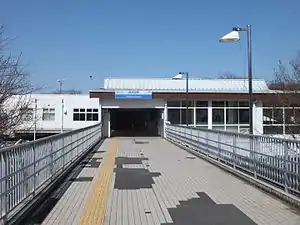Seibuen Station
Seibuen Station (西武園駅, Seibuen-eki) is a railway station on the Seibu-en Line in Higashimurayama, Tokyo, Japan, operated by the private railway operator Seibu Railway. The station provides direct access to Seibu Yuenchi Amusement Park and Seibu-en Velodrome.
SK06 Seibuen Station 西武園駅 | |
|---|---|
 Seibuen Station south exit (March 2016) | |
| Location | 4-29-1 Tamako-cho, Higashimurayama-shi, Tokyo (東京都東村山市多摩湖町四丁目29-1) Japan |
| Operated by | |
| Line(s) | |
| Platforms | 1 side + 1 island platform |
| Connections |
|
| Other information | |
| Station code | SK06 |
| History | |
| Opened | 1930 |
| Previous names |
|
| Passengers | |
| FY2014 | 3801 |
| Location | |
 SK06 Seibuen Station Location within Japan | |
Lines
Seibuen Station is the terminus of the Seibuen Line, a 2.4 kilometer spur line from Higashi-Murayama Station.
Station layout
The station has one terminating side platform and one terminating island platform. Both platforms are ground-level and are connected by a footbridge.
History
The station opened on 5 April 1930[1] as Murayama Chosuichi-mae Station (村山貯水池前駅). It was renamed Sayama Kōen Station (狭山公園駅) on 1 March 1941. The station was closed on 10 May 1944, reopening on 1 April 1948 as Murayama Chosuichi Station (村山貯水池駅). It was renamed to its present name on 23 May 1950. The station was relocated 400 meters north to its present location on 20 September 1961, and was renamed to its present name on 25 March 1975. Station numbering was introduced on all Seibu Railway lines during fiscal 2012, with Seibu-Yūenchi Station becoming "ST07" for the Seibu Tamako Line and "SY01" for the Seibu Yamaguchi Line.[2] A new station building was completed in July 1990.
Station numbering was introduced on all Seibu Railway lines during fiscal 2012, with Seibuen Station becoming "SK06".[3]
Passenger statistics
In fiscal 2014, the station was the 80th busiest on the Seibu network with an average of 3,801 passengers daily.[4]
References
- Terada, Hirokazu (19 January 2013). データブック日本の私鉄 [Databook: Japan's Private Railways]. Japan: Neko Publishing. p. 227. ISBN 978-4-7770-1336-4.
- 西武線全駅で駅ナンバリングを導入します [Station numbering to be introduced at all Seibu stations] (PDF). News Release (in Japanese). Japan: Seibu Railway. 23 February 2012. Archived from the original (PDF) on 2015-09-24. Retrieved 2 April 2013.
- 西武線全駅で駅ナンバリングを導入します [Station numbering to be introduced at all Seibu stations] (PDF). News Release (in Japanese). Japan: Seibu Railway. 23 February 2012. Archived from the original (PDF) on 2015-09-24. Retrieved 2 April 2013.
- 駅別乗降人員 2014(平成26)年度 1日平均 [Average daily station usage figures (fiscal 2014)] (PDF) (in Japanese). Japan: Seibu Railway. Archived from the original (PDF) on 8 March 2016. Retrieved 17 July 2014.
External links
| Wikimedia Commons has media related to Seibuen Station. |
- Seibu Railway page for Seibuen Station